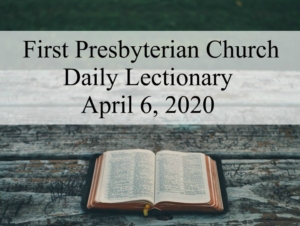
First Reading Lamentation 1:1-2, 6-12
Second Reading 2 Corinthians 1:1-7
12On the following day, when they came from Bethany, he was hungry. 13Seeing in the distance a fig tree in leaf, he went to see whether perhaps he would find anything on it. When he came to it, he found nothing but leaves, for it was not the season for figs. 14He said to it, “May no one ever eat fruit from you again.” And his disciples heard it.
15Then they came to Jerusalem. And he entered the temple and began to drive out those who were selling and those who were buying in the temple, and he overturned the tables of the money changers and the seats of those who sold doves; 16and he would not allow anyone to carry anything through the temple. 17He was teaching and saying, “Is it not written, ‘My house shall be called a house of prayer for all the nations’? But you have made it a den of robbers.” 18And when the chief priests and the scribes heard it, they kept looking for a way to kill him; for they were afraid of him, because the whole crowd was spellbound by his teaching. 19And when evening came, Jesus and his disciples went out of the city.
20In the morning as they passed by, they saw the fig tree withered away to its roots. 21Then Peter remembered and said to him, “Rabbi, look! The fig tree that you cursed has withered.” 22Jesus answered them, “Have faith in God. 23Truly I tell you, if you say to this mountain, ‘Be taken up and thrown into the sea,’ and if you do not doubt in your heart, but believe that what you say will come to pass, it will be done for you. 24So I tell you, whatever you ask for in prayer, believe that you have received it, and it will be yours.
25“Whenever you stand praying, forgive, if you have anything against anyone; so that your Father in heaven may also forgive you your trespasses.”
Mark’s story follows a familiar pattern: an episode, an interlude, and a conclusion to the first episode. Jesus curses a fig tree, overturns the tables of the money changers, and discovers the withered tree. Called, whimsically, a “Markan sandwich,” the form suggests the interpretation. The main episode and the interlude are often related, examples of one another. The central interlude is the meat and the outer story is the bread which frames it. The frame is, ostensibly, a story about prayer. Whatever we ask for in prayer, Jesus says, “believe that you have received it, and it will be yours.” We wonder, why would Jesus even pray that a tree would wither? What would this be confirmation that God hears our prayers? Maybe something else is going on. That’s when we look at the meat. The meat shows what happens when prayer is neglected—a sacrificial economy has taken over the work of the temple, which includes unfaithful practices like lending at interest, exploitation of the poor, and a tacit approval of idolatry through accepting foreign money. It’s no wonder Jesus disrupts this; what’s supposed to be a house of prayer has become a den of robbers. Jesus does not want his disciples or the people of God to neglect prayer—see it’s power in the episode of the fig tree. Because it’s the absence of prayer that makes something wither. Maybe this is Mark anticipating the fall of the temple in his time. When something breaks, when something whither, where do we turn? That’s when we revisit the story and the confidence Jesus gives: “So I tell you, whatever you ask for in prayer, believe that you have received it, and it will be yours.”
Gracious God, we put our faith in you, trusting that you our working for the good of those who love you, trusting that your healing will cover the creation you made and love. We pray for an end to suffering to all who are most afflicted by the coronavirus. We pray your protection for healthcare workers and family members and all who care for the sick. We pray that you would provide for those who have lost work or hope during this time of crisis. We pray that you would act, bringing to life those places in our country and in ourselves that whither, that we be renewed by your Spirit, bearing the fruit of your hope in our lives and in our prayers, through Jesus Christ, your Son. Amen.
